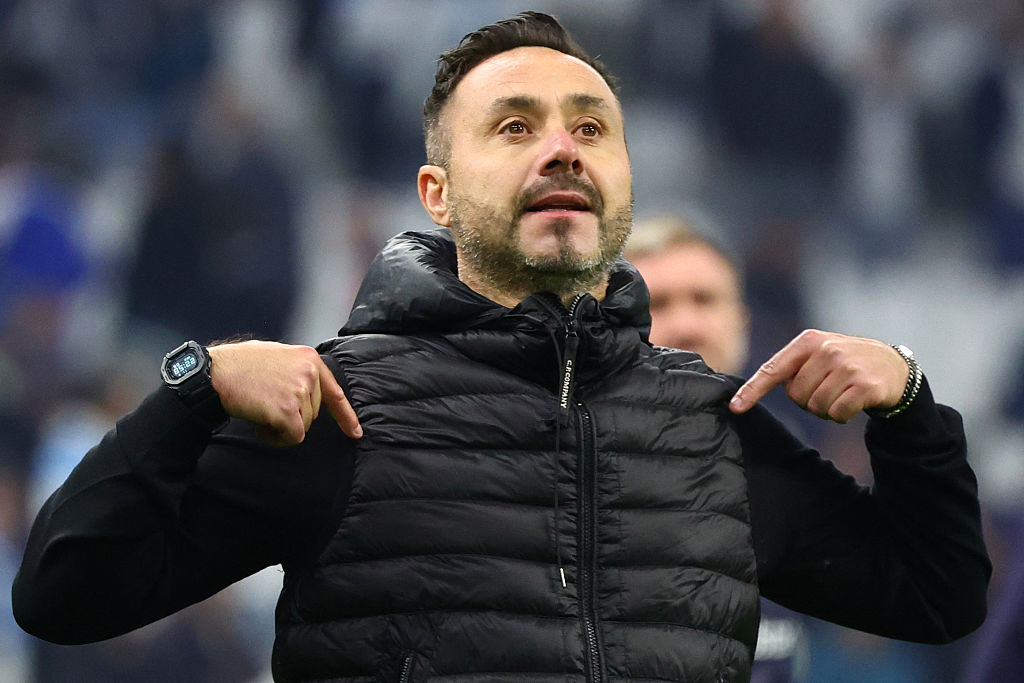Champions League Controversy: VAR’s Failure to Award Penalty Sparks Outrage and Division Among Fans and Coaches
Olympique Marseille’s struggles in the Champions League have become a focal point of frustration and controversy this season. With three defeats in four matches, the team’s performance has been under scrutiny, but it was their recent match against Atalanta Bergamo that ignited a firestorm of debate. The game, which concluded with a decisive goal in the 89th minute, left Marseille fans and players questioning the integrity of the officiating, particularly regarding a potential handball incident involving Atalanta’s Ederson.
As the match approached its climax, the tension was palpable. Marseille had been fighting hard for a much-needed victory, and the prospect of a handball against Ederson seemed to offer a glimmer of hope. The ball had struck Ederson’s arm, and the collective gasp from the Marseille supporters echoed throughout the stadium. Many believed that this was a clear case for a penalty, a moment that could have turned the tide for the French side. However, the referee’s decision to overlook the incident has led to accusations of injustice and bias.
The outcry from the Marseille camp was immediate and intense. Fans took to social media to express their outrage, labeling the decision a “theft” and a “shame.” The frustration was not limited to the supporters; coach Roberto De Zerbi took matters into his own hands by presenting evidence of the handball to the referee using his tablet. This act of defiance, however, resulted in a yellow card for De Zerbi, further compounding the sense of injustice felt by the team and its fans. The goal for Atalanta stood, and Marseille was left empty-handed, their hopes of a comeback dashed in the dying moments of the match.
The incident has reignited the ongoing debate surrounding the use of Video Assistant Referee (VAR) technology in football. VAR was introduced to enhance the accuracy of officiating and to minimize the impact of human error on the game. However, critics argue that its implementation has been inconsistent and often leads to more confusion than clarity. In this case, the failure to review the handball incident raises questions about the effectiveness of VAR and the accountability of match officials.
The ramifications of such decisions extend beyond the immediate match. For Marseille, the loss not only affects their standing in the Champions League but also has financial implications. Success in this prestigious tournament is vital for clubs seeking to bolster their revenues through prize money and increased visibility. The emotional toll on players and fans cannot be understated either; moments like these can define a season and impact the morale of a team.
De Zerbi’s reaction after the match, where he provocatively engaged with the Atalanta supporters, highlights the emotional stakes involved in high-pressure matches. Coaches and players are often under immense pressure to perform, and when they feel wronged by officiating, it can lead to heated exchanges and heightened tensions. The incident serves as a reminder of the passionate nature of football, where every decision can have significant consequences.
As the debate around VAR continues, it is essential to consider the broader implications for the sport. The introduction of technology was meant to enhance the game, but incidents like this raise concerns about its reliability and the potential for further controversy. Fans and players alike are left to grapple with the uncertainty of officiating decisions, and the trust in the system is increasingly being called into question.
The situation at Marseille is emblematic of a larger issue within football. The stakes are high, and the pressure to perform is immense. When teams feel that they have been wronged, it can lead to a breakdown in trust between the officials and the clubs. The fallout from this match will likely linger, as Marseille seeks to regroup and refocus for the remainder of the season, while the debate over VAR and its role in the game rages on.
In the end, the incident serves as a microcosm of the challenges facing modern football. The intersection of technology, human judgment, and the passionate nature of the sport creates a volatile mix that can lead to controversy and division. As fans, players, and coaches continue to navigate this landscape, the hope remains that the integrity of the game will prevail, and that decisions made on the pitch will reflect the true spirit of competition.

Things aren’t going so well for Olympique Marseille in this Champions League season. Three defeats in four games is OM’s record so far. Especially last night against Atalanta Bergamo, it was extremely close. The decisive goal didn’t come until the 89th minute.
Just before the goal for the Serie A club, the ball hit Ederson’s arm and all of Marseille suspected a handball.
⚽ But de l’Atalanta 0-1 accordé… sur la contre-attaque, QUEL HONTE, C’EST CLAIREMENT DU VOL !!! Pourtant il y a bien main et pénalty non accordé pour l’OM ! 😤
Arbitre de m*rde ! 🤬#TeamOM#omatapic.twitter.com/BnOfcs2jwW
— ALLEZ L’0M 💙🤍 (@ALLEZ_L0M) November 5, 2025
DE ZERBI QUI SORT LA TABLETTE POUR MONTRER À L’ARBITRE LA MAIN !!! 😱😱
Mais l’arbitre ne veut rien savoir ❌❌❌
Carton jaune pour RDZ 🟨 pic.twitter.com/anFt5Fb04p
— BeFootball (@_BeFootball) November 5, 2025
Coach Roberto De Zerbi even showed the referee team his tablet to draw attention to the alleged handball. For that, the OM coach received a yellow card, and in the end, the goal stood.
Double bad luck for the French, who are left empty-handed. De Zerbi’s frustration was still evident after the match, as he went on to provoke the home fans.
Roberto De Zerbi qui provoque le parcage des supporters de l’Atalanta Bergame… 😭
📸 @laloumancepic.twitter.com/YdSOYr2KkQ
— Foot Mercato (@footmercato) November 5, 2025
A clear wrong decision? What do you think about the scene? Let us know in the comments.
This article was translated into English by Artificial Intelligence. You can read the original version in 🇩🇪 here.
📸 CLEMENT MAHOUDEAU – AFP or licensors
